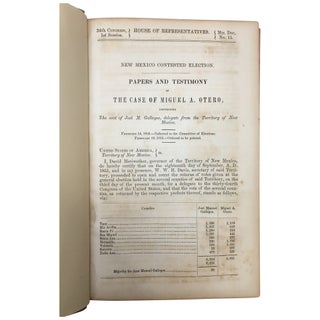Latinx Politics in 19th Century New Mexico
New Mexico Contested Election. Papers and Testimony in the Case of Miguel A. Otero, Contesting the Seat of José M. Gallegos, Delegate from the Territory of New Mexico
Notes: A scarce look at nuevomexicano life in the mid-19th century. Very few accounts by Mexican Americans are known from the nineteenth century and much of what survives was written later. However one seldom tapped resource are the records of the contested elections for the House of Representatives, which include testimony from many residents. The purpose of these reports was to gather facts about voting irregularities, but in the process, the attorneys for the candidates elicited much detail about nuevomexicano life, culture, and business. The depositions are just a snapshot in time but they provide details rarely found elsewhere in the contemporary record.
In 1853, the people of the Territory of New Mexico elected José M. Gallegos to represent them as a delegate to the House of Representatives. Gallegos thus became the first Mexican American and second Hispanic (after Joseph Marion Hernández of Florida) to serve in Congress. After his first term, he won a close reelection race with Miguel Antonio Otero, the father of the future territorial governor with the same name.
Otero was more politically connected than Gallegos and would serve a number of roles in New Mexican government. After initially losing the vote count, he appealed Gallegos's election to the House of Representatives, which investigated and awarded the seat to Otero.
Otero argued on somewhat questionable evidence that Gallegos's 99-vote majority was the result of illegal voting by New Mexico residents who, under the Treaty of Guadalupe Hidalgo, had opted for Mexican citizenship. Many other examples of improper voting on both sides were also alleged, including priests rejecting votes for Otero, bandits stopping election officials and substituting ballots, and much voting of minors.
The election dispute seems to have mostly involved majority nuevomexicano regions of New Mexico. The testimony and evidence presented in this case provide a trove of information about life in New Mexico in the mid-19th century. For example, under the Treaty of Guadalupe Hidalgo, residents of New Mexico had one year to elect to retain their Mexican citizenship. If they did not opt to retain their Mexican citizenship, they automatically became American citizens. The process for opting out was ill-defined and local county officials seem to have kept their own records.
Otero claimed that many men on these informal lists of Mexican citizens had voted illegally. Gallegos's attorneys solicited testimony that the names of those opting for Mexican citizenship were added to the lists without any formal request.
For example, Miguel Pino testified, "Mr. Ortiz wanted me to make out a list of persons who intended to go to Mexico... We were at that time living under a military government, and it oppressed us so much that we intended to emigrate, and I therefore put their names in a book, and induced some others to do so too."
A facsinating document, worthy of further study. For more about this election, see Fray Angelico Chavez's study of Gallegos, Trés Macho—He Said.
271 pages.
Edition + Condition: A very good copy, attractively bound in quarter-leather and decorated paper.
Publication: Washington, DC: House of Representatives, 1856.
Item No: #13391
Price: $1,000


